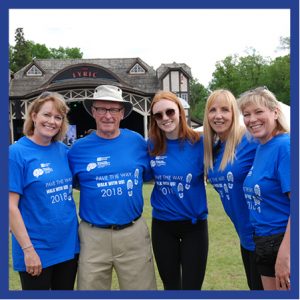In This Issue
Will You Participate in Our eNewsletter Survey?
Brain Awareness Week
Actress Jill Daum Talks About How She Lives With Dementia
Get Ready to Walk!
Police Cadets Learn the Details About Dementia
The Butterfly Model: An Injection of Compassion and Humanity
Helping a Person with Dementia Stay Connected in Their Neighbourhood
Our Spring Calendar is Out!
Education and Programs
Events and Volunteering
Will You Participate in Our eNews Survey?

We want to provide you with relevant, educational and helpful information about dementia. Please help us improve our monthly eNewsletter by filling out this survey. It will only take a few minutes of your time.
To entice you further, we’re offering a prize to a lucky winner! Emails of those who complete the survey will be entered into a draw to win an Alzheimer Society branded tote, lunch bag, water bottle, pet-kerchief and neck warmer. We’re also throwing in a gigantic pair of blue sunglasses for your dress-up box!
If you’ve already filled out the survey, please send us your email address so you won’t miss the chance to be entered to win!
Click here to access the survey.
THANK YOU!
March 11-17 is Brain Awareness Week
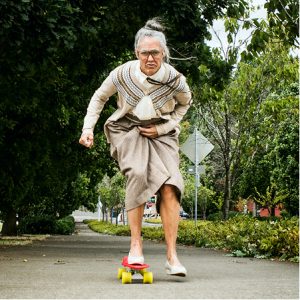
With the help of brain research, there is hope that one day there will be a cure for dementia and other brain diseases and disorders. That’s why brain research is celebrated during Brain Awareness Week, which takes place this year from March 11 to 17.
At the Alzheimer Society, we promote brain health to help reduce the risk of developing dementia. There are lots of things you can do, including challenging yourself, being socially and physically active, and reducing stress in your life.
Click here to read about the many ways you can keep your brain healthy.
YES. I LIVE WITH DEMENTIA.
Let me help you understand.

Actress Uses Humour to Lighten Burden
For 25 years, the five actresses in the Mom’s the Word Collective have been telling hilarious and heartwarming stories about their lives from stages across Canada and around the world.
The troupe has talked about becoming moms, becoming moms of teenagers and becoming moms watching their kids leave the nest ̶ and surviving it all. In their fourth iteration of the show, “Mom’s the Word: Nest ½ Empty,” playing at Prairie Theatre Exchange (PTE) until March 17, they each take a turn talking about the latest chapters in their lives.
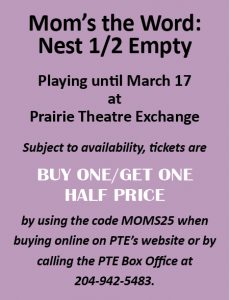 For Vancouver actress Jill Daum, a founding member of the collective, it’s often hard to see the funny in her life these days.
For Vancouver actress Jill Daum, a founding member of the collective, it’s often hard to see the funny in her life these days.
Her husband, John Mann ̶ best known as the frontman for the band Spirit of the West ̶ was diagnosed with young onset Alzheimer’s disease seven years ago. For two years, Jill travelled with the band, acting as John’s caregiver, until he could no longer perform. The band did a farewell tour in 2016.
Today, her husband, now 56 and in a care home, “is really, really deep within the fog of Alzheimer’s.” But she says there is comfort in the fact that John seems to be singing almost all the time. “You can sort of tell from the way his body and head are moving and the vocalizations he’s making.”
In the PTE show, Jill talks about her “wobbly path to acceptance” of her husband’s condition. “I talk about the overwhelmingness of the diagnosis, telling the kids and going to the Alzheimer Society for the first time.”
Humour Alongside Grief
She promises the audience that there’s some humour, too. “If you nail a truth, you’re funny because it’s a recognizable thing.”
But the relentlessness of the grief is hard, she says. “You get mired in the grief because you don’t move forward. You know it’s the world’s longest exit. You’re still caring for someone who is only partially here.”
Being able to talk about it onstage lightens her burden. “It’s like that for anybody. If you can articulate and name your experience and share it with others, camaraderie happens. You’re not alone.”
Get Ready to Walk!
The 2019 IG Wealth Management Walk for Alzheimer’s will take place on:
Thursday, June 13, 2019 at 5:30 pm
Assiniboine Park Lyric Theatre
Winnipeg, Manitoba
It’s time to get your teams together for this fun family event in support of the Alzheimer Society. You can walk with your team, your friends or as an individual while enjoying entertainment, a BBQ and the cammaraderie of your fellow walkers.
Click here to register for the Winnipeg Walk or for information about hosting a walk in your community.
Not from Winnipeg? Information about Walks across the province coming soon!
Police Cadets Learn the Details About Dementia
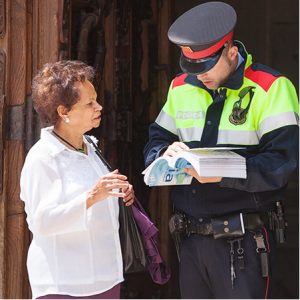
A concerned citizen calls the Winnipeg Police Service (WPS) to report that their car has been stolen…or their spouse is missing…or they believe someone has broken into their home. Naturally, the police take the call seriously and respond accordingly.
Sometimes, says Constable Pat Chabidon, it doesn’t take long for the police officer doing the follow up to recognize that the person they’re dealing with may have Alzheimer’s disease or another form of dementia. That realization comes, in part, thanks to the training provided by the Alzheimer Society of Manitoba through its Dementia Friendly Communities Initiative.
Constable Chabidon, who works in the vulnerable persons unit of the WPS, says the Dementia Friendly Communities training provided to recruit and cadet classes each year is an integral part of their learning. That’s because the police department is responding to more and more calls involving people with dementia.
Sometimes, a person with dementia calling about a stolen car has forgotten that their family took away the vehicle due to driving safety concerns. Or it may be that the spouse being reported as “missing” has actually passed away.
The Best Approach
“It’s good for our cadets and recruits to get a basic knowledge of dementia so they can recognize a person who has it,” says the constable. He points out that it’s also important for students to learn who to contact within the police service or at an outside agency to obtain assistance regarding next steps.
Through the training, recruits and cadets learn that it’s imperative to approach a person with dementia in a calm and quiet manner, as too much energy could cause reactionary behaviour.
Most often, calls of this nature are referred to Constable Chabidon and the social worker assigned to the vulnerable persons unit, who then make a home visit to learn more about the person. They may refer the person to the geriatric mental health team for an assessment or to another appropriate agency. Families at a loss about what to do may be pointed in the Alzheimer Society’s direction.
Constable Chabidon was a street cop for 20 years before being assigned to the vulnerable persons unit five years ago. He says it was his experience working with agencies like the Alzheimer Society that led him to take the position.
“I’ve always liked working with outside agencies because we’re there to help each other,” he says.
The Society feels the same way: it has enjoyed a fruitful and long standing relationship with the WPS over many years.
The Butterfly Model:
An Injection of Compassion and Humanity

Those working in health care, and especially those caring for people with dementia, are familiar with the concept of person centred care. Definitely something to strive for in professional health care settings, this concept puts the needs and preferences of the person first.
Although empathic professional caregivers may fully support this concept, their ability to provide it can be limited by the policies and procedures that exist in the system. This may mean that individual preferences – the very thing that person centred care is supposed to be about – are set aside.
For example, a facility’s routine may dictate that residents must wait for the 5 pm dinner bell to eat their evening meal. But what if a resident is hungry for dinner at 4 pm?
The Butterfly Model of Patient Care, the brainchild of Dr. David Sheard of Dementia Care Matters in Britain, attempts to change the culture in the often clinical environments of long term care settings. It does so by injecting compassion and humanity into both the physical surroundings and the emotional interactions between residents and staff.
Joyce Klassen, Dementia Care Education Coordinator at the Alzheimer Society, recently attended a workshop to learn more about the Butterfly Model. “Facilities using this model try to make themselves feel more like a home than an institution,” she says. “They use bright colours, and rooms contain engaging and familiar items like those that would be found in a person’s home.”
Not only that, but staff members trade uniforms for street clothes, and they don’t roll medication carts around the unit. “It’s a feeling of ‘we’ rather than ‘them and us.’ Staff think about ‘being with,’ not ‘doing for,’” explains Joyce.
Let’s Talk About Orange Marmalade
Instead of being protective and controlling, interactions between staff and residents, like those between family and friends, are based on mutual respect and caring.
Take the task of offering snacks to a resident. With the Butterfly Model, a staff member would not simply hand the person a piece of toast smothered in jam. Instead, the person is first asked if they’d like toast, and then they are given a choice of breads and toppings. But the positive interaction doesn’t end there. The staff member might comment on the delicious scent of the marmalade and how it reminds them of picking oranges on a trip to Florida.
“The exchange becomes more like a conversation between friends – not just a task that must be completed by the staff member,” says Joyce. “It’s mutually engaging and shows respect to the person, while at the same time offering choice, engaging the senses and encouraging reminiscing.”
Preliminary studies indicate that, in facilities using the Butterfly Model, medication use is decreased, there are fewer falls and the use of physical restraints is decreased.1
Joyce sees may benefits in the approach the Butterfly Model puts forward. “People with dementia evaluate care the same way anyone else does,” she says. “It’s the relationships that count. It’s what we do to connect with others that’s most important.”
1 Schelks, Kerry. Making Moments Matter: ‘Butterfly’ model sees positive results, Australian Journal of Dementia Care, April/May, 2017, Vol. 6 No. 2.
Helping a Person with Dementia Stay Connected to Their Neighbourhood
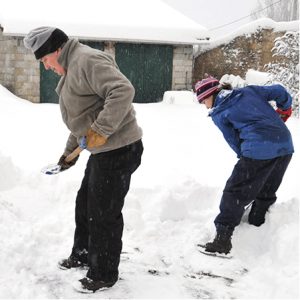
Everyone benefits from a walk outdoors or a friendly visit with neighbours. It’s important for people with dementia to have this opportunity, too. As a family member or friend, here are some ways you can help the person stay involved in neighbourhood activities:
- Take the person to community events, such as garage sales, farmers’ markets and sporting events. Meeting neighbours and friends on these occasions maintains relationships.
- Encourage the person to do yard work and activities in the garage or on the driveway. Plan to join them in the activity. Assisting with routine yard and home maintenance helps the person to retain skills and gives them the opportunity to contribute.
- If the person with dementia is able to walk alone, check that they are wearing suitable clothing and comfortable non-slip shoes. Ensure they are carrying identification, including their address and phone number and the caregiver’s contact information.
- When the person can no longer go out alone, make plans for them to go for walks accompanied by friends or neighbours. Walking is great for everyone and minimizes the risk that the person may become lost.
- Cultivate a community support network by advising neighbours that the person with dementia may become disoriented when out and about. If the person appears lost, encourage neighbours to assist the person to return home or to contact family caregivers.
Creating a supportive environment outside the home encourages a person with dementia to stay connected with their neighbourhood, which can help maintain cognitive health and boost self-esteem.
Our Spring Calendar is Out!
 This spring, the Alzheimer Society is all set to provide you with a variety of educational programs to help you on your journey with dementia.
This spring, the Alzheimer Society is all set to provide you with a variety of educational programs to help you on your journey with dementia.
Our Family Education Sessions cover topics ranging from driving and dementia to managing financial and legal matters when you are a Power of Attorney.
We also offer a three-part Living With Dementia Workshop that features presentations on the disease process from a medical, family and individual perspective. Presenters take a look legal and financial considerations, helpful community resources, caregiver tips and home safety.
Click here to sign up for any of our spring sessions or to obtain more information.
Education and Programs
Events & Volunteering

